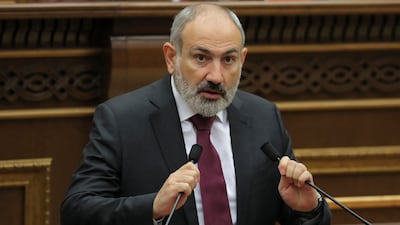Azerbaijan's defence ministry said on Tuesday that 50 military personnel died during overnight clashes with Armenia in the heaviest fighting between them since their 2020 war over the Nagorno-Karabakh region.
Azerbaijan had announced earlier that it had completed its military objectives on the border with Armenia.
“Provocations committed by Armenian forces at the border have been averted and all necessary objectives were fulfilled,” President Ilham Aliyev's office said in a statement following his meeting with the military leadership.
The conflict followed a ceasefire struck by Azerbaijan and Armenia on Monday after fighting over Nagorno-Karabakh began again.
The pact fell apart within minutes, Azerbaijani media said.
The agreement came into force at 9am local time, according to media reports and a Reuters source.
Defence ministries in Baku and Yerevan did not elaborate on their casualties.
Russia called on both nations to stop hostilities and observe a ceasefire agreement, expressing “extreme concern” over renewed fighting.
The Russian Foreign Ministry said it had brokered the ceasefire and it expected both sides to honour the agreement.
“We express our extreme concern over the sharp aggravation of the situation in areas of the Armenian-Azerbaijani border,” the ministry said in a statement.

“We call on the sides to refrain from further escalation of the situation, exercise restraint and strictly observe the ceasefire.”
Iran also appealed for restraint from its neighbours on Tuesday.
Tehran called for “restraint and the peaceful resolution of disputes between the two countries, and expresses its concern over the escalation of tensions,” Foreign Ministry spokesman Nasser Kanaani said.
US Secretary of State Antony Blinken expressed deep concern over the escalation and called for an immediate cessation of hostilities in calls to both sides, Washington said on Tuesday.
Mr Blinken spoke overnight with Mr Aliyev “to express deep concern over military action along the Armenia-Azerbaijan border, including shelling in Armenia”, the State Department said.
In another call with Armenia's prime minister, he “stressed the need for disengagement of military forces and assured Prime Minister Pashinyan that the United States would push for an immediate halt to fighting and a peace settlement between Armenia and Azerbaijan”.
Turkey supports Azerbaijan
Turkey said on Tuesday it will continue to back Azerbaijan and called on Armenia to “cease its provocations”.
Turkish Defence Minister Hulusi Akar held talks with his Azerbaijani counterpart Zakir Hasanov, the ministry said.
“He emphasised that Turkey has always stood by brotherly Azerbaijan and will continue to stand by it in its just causes,” it said.
Turkish Foreign Minister Mevlut Cavusoglu said he had also discussed the situation with Azerbaijan's Foreign Minister Jeyhun Bayramov.
“Armenia should cease its provocations and focus on peace negotiations and co-operation with Azerbaijan,” he said on Twitter after the talks.
Turkish and Azerbaijani forces have held joint military drills since the 2020 conflict to improve their combat interoperability.
'Aggressive actions'
On Tuesday, Mr Pashinyan talked with the French and Russian presidents and the US secretary of state after “provocative, aggressive actions” by Azerbaijan, his office said.
In his phone calls, Mr Pashinyan “emphasised the importance of adequate reaction from the international community”.
“Azerbaijani forces continue using artillery, trench mortars, and drones … striking military and civilian infrastructure. The enemy is trying to advance [into Armenian territory],” Armenia's Defence Ministry said on Tuesday.

Earlier, the Azerbaijani Defence Ministry said its forces were responding to Armenian provocation and denied claims that they were hitting civilian infrastructure.
“Azerbaijani armed forces are undertaking limited and targeted steps, neutralising Armenian firing positions,” it said.
Armenia said that Azerbaijani forces “launched intensive shelling, with artillery and large-calibre firearms, against Armenian military positions in the direction of the cities of Goris, Sotk, and Jermuk” shortly after midnight.
But Azerbaijan's Defence Ministry accused Armenia of “large-scale subversive acts” near the districts of Dashkesan, Kelbajar and Lachin on the border. It added that its army positions “came under fire, including from trench mortars”.
The US called for an end to the conflict on Monday night, with Secretary of State Antony Blinken saying it was “deeply concerned” about the situation, including “reported strikes against settlements and civilian infrastructure” in Armenia.
“As we have long made clear, there can be no military solution to the conflict,” Mr Blinken said. “We urge an end to any military hostilities immediately.”
Two wars fought
Last week, Armenia accused Azerbaijan of killing one of its soldiers in a border shoot-out.
In August, Azerbaijan said it had lost a soldier, while the Karabakh army said two of its troops had been killed and more than a dozen injured.
The neighbours fought two wars — in the 1990s and in 2020 — over the region, Azerbaijan's Armenian-populated enclave.
More than 6,500 people were killed in six weeks of fighting in the autumn of 2020. That ended with a Russian-brokered ceasefire.
Under the deal, Armenia ceded parts of territory it had controlled for decades and Moscow sent about 2,000 peacekeepers to monitor the truce.
During EU-mediated talks in Brussels in May and April, Mr Aliyev and Mr Pashinyan agreed to “advance discussions” on a peace treaty.
Armenians in Nagorno-Karabakh broke away from Azerbaijan when the Soviet Union collapsed in 1991. The ensuing conflict killed about 30,000 people.

